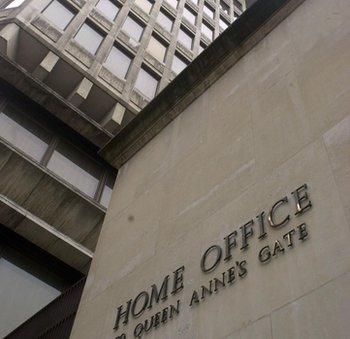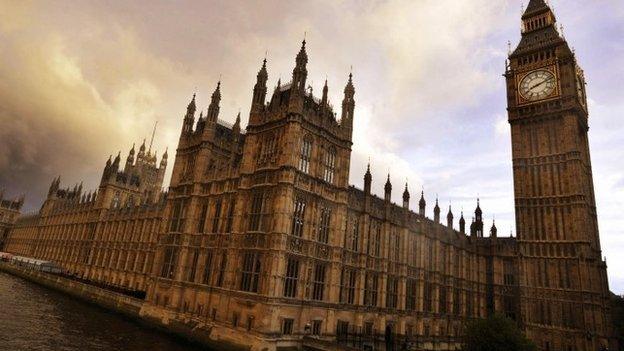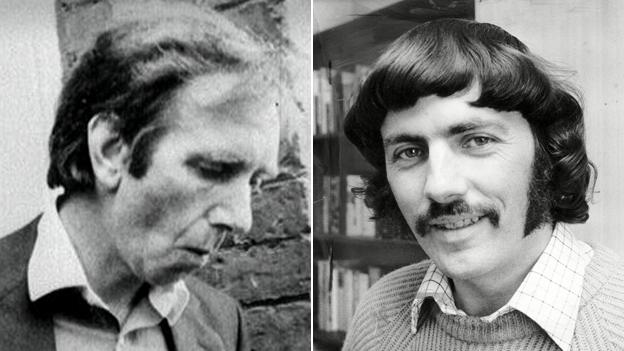Paedophile group leader 'stored material at Home Office'
- Published

The former leader of a pro-paedophile campaign group claims he stored material at the Home Office, according to an account seen by the BBC.
Steven Adrian Smith had clearance to work as an electrical contractor at the Westminster building in the late 1970s and early 1980s when he chaired the Paedophile Information Exchange.
The Home Office declined to comment on Smith, who was jailed in 1991 and 2011.
It said an inquiry into whether PIE received any public funds was ongoing.
A review last year found that 11 Home Office files from the 1980s relating to the Paedophile Information Exchange had been destroyed.
It comes amid a separate Home Office review ordered by Prime Minister David Cameron into what happened to a "dossier" allegedly naming high-profile child abusers handed to then Home Secretary Leon Brittan in 1983.
Lord Brittan said last week he received a "substantial bundle of papers" from the late Conservative MP Geoffrey Dickens and handed it to officials.
A Home Office review last year "did not find a single dossier from Mr Dickens, but several sets of correspondence over a number of years", according to its top civil servant Mark Sedwill.
Home Secretary Theresa May is due to address Parliament later on the row.
'No police'
PIE was set up in the mid 1970s and argued for the effective abolition of a legal age of sexual consent.
Steven Adrian Smith, also known as Steven Freeman, became the group's leader in 1979, around the same time he began employment with an electrical firm contracted to work at the Home Office's then headquarters at Queen Anne's Gate in Westminster.
The BBC has seen an account of events from the time written by Smith and discreetly published in 1986 in a book now in a restricted area of the British Library.
Smith said he worked for four years inside the Home Office where his job was to monitor a control panel of alarm systems.
He wrote: "I had a furnished office completely to myself seven days a week on a rotating shift basis.
"Much of PIE's less sensitive file material was stored in locked cabinets there, where no police raid would ever have found them."
He said his security clearance was renewed each year by police without his connection to the group being discovered.
His claims are corroborated by witness statements at two later trials involving PIE members.
In 1984 an Old Bailey jury heard Smith used a Home Office phone as a contact number for the paedophile group.
In 1991 he was jailed for 18 months after a trial which heard that an obscene magazine in which people wrote about their sexual experiences with children was probably "published" inside the Home Office.
Smith's employment at the Home Office came to an end in 1982 after an anti-PIE campaigner infiltrated the group and revealed that its leader and another member were employed in the government building.
The pair had their security clearance cancelled and a Home Office spokesman said at the time it was "unlikely" Smith ever met the home secretary and that he "never worked in any capacity involving security".
But in his own account of events, Smith wrote of his surprise at the fact that the story was not noticed by most of the newspapers, saying he thought it could have brought down the then Home Secretary, Willie Whitelaw.
"Obviously, the 'ruling class' had to be protected," he wrote.
Mr Dickens campaigned for PIE to be banned but met resistance from ministers who argued existing laws were enough to jail paedophiles.
'Truth will come'
Campaigners arguing for an over-arching inquiry into historical claims of child abuse have described as "horrifying" the claim that material published by a paedophile group was stored in the Home Office.
Anti-abuse campaigner Ian Pace, a lecturer at City University who has researched the history of PIE, urged government officials to re-examine what happened.
"It certainly needs to be investigated more," he said.
"The Home Office should be looking in great detail at this."
Former child protection officer Peter McKelvie worked on a case involving founding PIE member Peter Righton, an academic who was highly influential in the world of social work and child protection.
"The truth will come out," Mr McKelvie said.
"But survivors need to have the right forum to be able to come forward and speak.
"They must be able to speak to people that they haven't spoken to in the past - who haven't believed them, who haven't listened to them, or have just ignored them."
Steven Adrian Smith, who is now in his 50s, was given an indeterminate jail term in 2011 for possessing indecent images of children.
- Published7 July 2014

- Published6 July 2014

- Published27 February 2014
